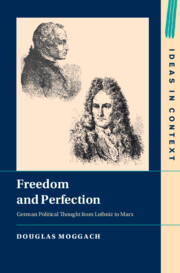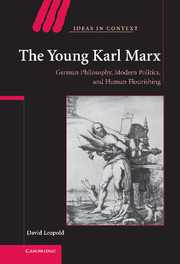Freedom and Perfection
Leibniz, this study argues, is the genuine initiator of German Idealism. His analysis of freedom as spontaneity and the relations he establishes among freedom, justice, and progress underlie Kant's ideas of rightful interaction and his critiques of Enlightened absolutism. Freedom and Perfection offers a historical examination of perfectionism, its political implications and transformations in German thought between 1650 and 1850. Douglas Moggach demonstrates how Kant's followers elaborated a new ethical-political approach, 'post-Kantian perfectionism', which, in the context of the French Revolution, promoted the conditions for free activity rather than state-directed happiness. Hegel, the Hegelian School, and Marx developed this approach further with reference to the historical process as the history of freedom. Highlighting the decisive importance of Leibniz for subsequent theorists of the state, society, and economy, Freedom and Perfection offers a new interpretation of important schools of modern thought and a vantage point for contemporary political debates.
- Combines perspectives from the history of political thought with philosophical analysis and conceptual history.
- Introduces post-Kantian perfectionism as a new approach in the history of political thought and ethics
- Demonstrates connections between leading German philosophers of the eighteenth and nineteenth centuries
Reviews & endorsements
‘Kant transformed political philosophy by making freedom rather than happiness the ‘essential end' of humankind, and Fichte, Hegel, and Marx rang variations on this theme. True enough, but so did Schiller and von Humboldt, and it all began with Leibniz, whom Kant adapted as well as criticized, and who remained the source of so much in German philosophy. Douglas Moggach tells this important story with verve as well as accuracy!' Paul Guyer, Brown University
‘Douglas Moggach unfolds the subjectivity-theoretical foundations of freedom by tracing the multi-layered paths from Leibniz to Marx. He demonstrates their relevance for contemporary ethics with impressive historical depth and great systematic clarity. For all readers interested in an up-to-date practical philosophy Freedom and Perfection is simply THE book to read.' Michael Quante, University of Münster
‘Douglas Moggach's Freedom and Perfection is a remarkable achievement. By tracing the development of German idealist thought from Leibniz, and with a focus on its political expression, Moggach has revealed a movement with that ‘unity in diversity' which for Leibniz had characterized the goal of the modern political community itself.' Paul Redding, The University of Sydney
Product details
June 2025Adobe eBook Reader
9781009590402
0 pages
Not yet published - available from June 2025
Table of Contents
- 1. Thinking freedom
- 2. Leibniz: spontaneity, justice, and perfection
- 3. Receptions of Leibniz: Wolff and Herder
- 4. The Kantian revolution
- 5. Foundational arguments: Humboldt and Dalberg on the scope and end of the state
- 6. Friedrich Schiller: perfection, freedom, and beauty
- 7. Fichte: the labour of spontaneity
- 8. Hegel as post-Kantian perfectionist
- 9. Hegelian perfectionism before 1848
- 10. Karl Marx: historical perfectionism
- Conclusion
- Select bibliography
- Index.






